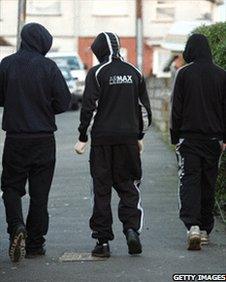Criminal justice watchdogs attack gangs strategies
- Published

Not enough is known about gangs, say the watchdogs
Efforts to tackle teenage gangs miss chances to rescue youngsters from criminality, watchdogs have warned.
The joint report by the chief inspectors of prisons, police and probation said strategies are patchy and often counter-productive.
The trio caution against exaggerating the power of gangs but warn schools and prisons against ignoring them.
Police Minister Nick Herbert said the government was determined to tackle gang-related crime.
No-one knows how many teenagers are in gangs and officials have no clear definition for the groups.
The report calls for a new national strategy to help the police, youth offending teams and other agencies to prevent teenagers becoming gang members - and to make it easier to rehabilitate those already involved in crime.
Police officers had the best understanding of the problems, said the report, but they were focused on catching criminals rather than worrying about their welfare.
Prisons often had the least sophisticated approach with some institutions separating rival gang members without realising how this unintentionally reinforced gang identity.
"Research showed that there was no integrated joint national strategy on gangs to support criminal justice and community agencies in tackling causes as well as effects," said the three chief inspectors, Dame Anne Owers, Andrew Bridges and Sir Denis O'Connor.
Dame Anne Owers is the Chief Inspector of Prisons, Andrew Bridges is Chief Inspector of Probation and Sir Denis O'Connor is Chief Inspector of Constabulary.
The report adds: "Agencies had therefore missed significant opportunities to work with young people involved or likely to get involved in gangs. This report suggests that such an approach is overdue."
One prison involved in the report would not admit that some of its inmates were in gangs, arguing that it did not want to "create a monster that does not exist."
And the watchdogs also warned that not enough was being done to target very vulnerable children being dragged into gang culture.
Protection and dangers
The limited research into gangs suggested some youngsters joined gangs to protect themselves, even though they knew they might be seriously injured or even killed.
"Some [criminal justice workers] felt that by the age of 12 or 13 some young people were steeped in gang culture and ideology. Schools were seen as having the ability to make a significant contribution to preventing this development.
"However, some schools were reluctant to engage in gang issues as they feared being 'labelled' as problem organisations."
The authors said: "It is important not to exaggerate the extent of genuinely gang-related activity among young people, or to assist its growth by glamorising it.
"However, where such activity does exist, it is pernicious - affecting the safety and well-being of those involved, as well as the safety of their families and the community."
Frances Done, of the Youth Justice Board, said that there had been "significant progress" since the report was commissioned in 2008.
"We have made huge strides in co-ordinating the work between the police and youth offending teams to map out gang activity in different communities," she said.
"And we have worked with custodial centres to safeguard under-18s by identifying gang members and placing them appropriately."
Police and Criminal Justice Minister Nick Herbert said the report raised important issues about how to tackle gangs at local and national level.
"Gangs can cause significant harm to our communities, through crime and the false sense of security they provide young people.
"This government is determined to work with its partners to tackle gang-related crime and provide support to help people leave gang life behind."
He said he will be "urging prisons, probation and youth offending teams to consider what more can be done".
Derrick Campbell, who works with gangs and advises the Home Office on the issue, said there had to be more co-ordination between agencies."
Mr Campbell told the 大象传媒: "The biggest problem we have is the joined up approach - there isn't a joined up approach in addressing this problem.
"You've got different departments - youth service, probation service, the police etc - all trying to do their bit, but there seems to be no cohesion in regards to how information is passed between these major departments."